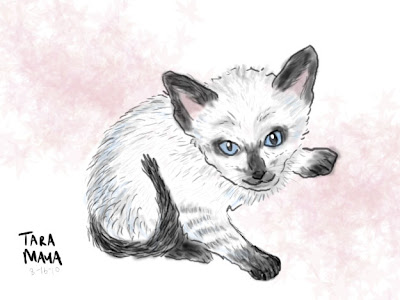When Should You Read Literary Novels?
 |
| Puddlepaws, the Gratuitously Adorable Kitten, from The Initiate |
None of this post will apply if you regularly read (or write) in the literary genre.
I love literary writing...in small dribbles. There are are certain gorgeous books, with such exquisite sentences and turns of phrase that they seduce my inner logophile into rapturous sighs of bliss. I can usually make it half-way through such a book before I realize I'm...bored.
The rest of the journey is a slog. Often, I'll find that the true power of the story doesn't hit until the end. So it's worth it to push through that boring part. It's not like the boring part of a badly written story, which you'd be better off without. It's drawing you in to the character's world or mind, making you love this person against all logic and expectation.
Literary novels revolve around people who aren't admirable doing things that aren't interesting. The literary writer's job is to write so beautifully that you don't notice. Also this brings us to the rule of thumb: You can write about dull things in an exciting way and you can write about exciting things in a dull way, and some bastards can even write about exciting things in an exciting way, but if you write about dull things in a dull way, no one will read your book.
I have found, however, the perfect time to read a literary novel, or short story collection, is when I am editing.
Plot pushes my stories around, piling up activities for the characters, the way a mom in a supermarket grabs boxed cereals for the next month of breakfasts. My characters engage in all sorts of angst and drama, but sometimes my dialogue is too "on the nose," as they say in screenwriting, rather than subtle and realistic.
Reading some exquisite crown of word-jewels during the editing reminds me that sentences can be beautiful, they can be complex, they can be unexpected. This helps me polish my prose, dial back the obvious where it was slamming the reader in the face, put on a shirt and shoes to go eat in the restaurant and not stomp around like a barbarian.
The time I try to avoid reading literary works is while I am brainstorming, outlining and drafting the manuscript (i.e. most of the time). What I read inspires what I write, so if I read literary novels while brainstorming a new book, I start to delude myself this time I'll write a literary book. Mustn't have that! Also, I start trying to Me Rite Purty too soon.
Trying to write beautiful sentences before I have the plot and the character arcs worked out would be deadly for the kind of story I want to write. It would risk it becoming...boring.
Have you noticed what an offensive post this is? I've managed to insult both literary and genre writing. This is what happens when I'm in Editing Mindset.
Comments
Some people want to have a cozy talk in the kitchen that goes comfortably round and round. Some people want to exchange witty banter, in language so beautiful that it pleasantly obscures the essential banality or even disjointedness of what is being said. And some people just want to know what happened, to whom, in what order, and why. Now, please.
There are techniques that can be learned to make each of these types of "conversation" work for their intended audience. When you sparkle up the language, you'll please the second and annoy the first and third type of reader. When you move events out of order, you'll please the first two and completely lose the third. And so on.
And, as you say, what you put into your head to a large degree flavors what comes back out.